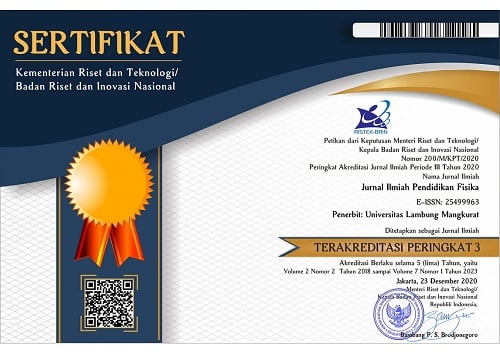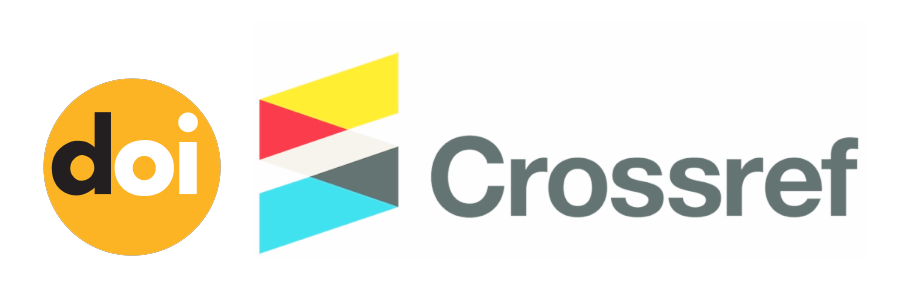Online Probelm-Based Learning to Enhace Student Creativity in Physics Learning
Abstract
This study aims to determine the increase in students' mastery of concepts and creative thinking skills after implementing the problem-based learning model. The sample in this study were students of class VIII MTs Ad-Diinul Qayyim West Lombok using a qualitative approach and the type of classroom action research. The material used in this research is Substance Pressure. This research was conducted in the second (even) semester of the 2018/2019 academic year. The instruments used in this study include 1) observation sheets on the implementation of learning by the teacher; 2) student activity observation sheets; 3) the concept mastery test instrument, and the creative thinking skill test instrument in the form of essay questions. The results showed that using a problem-based learning model could improve conceptual mastery and creative thinking skills, with the following scores: For knowledge of concepts in the first cycle, a score of 65.52% was obtained, and the second cycle was 89.65%. Meanwhile, for creative thinking skills using a test in the form of an essay, 37.93% was obtained, and the second cycle was 93%.
Keywords
Full Text:
PDFReferences
Amrullalah, K. A., Ibrahim, M., & Widodo, W. (2017). Kemampuan berpikir kreatif dan penguasaan konsep siswa kelas v sekolah dasar. Jurnal Review Pendidikan Dasar, 3(1), 378–387.
Annisa, R., Subali, B., & Heryanto, W. P. (2018). Peningkatan daya ingat dan hasil belajar siswa dengan mind mapping method pada materi listrik dinamis. Jurnal Pendidikan (Teori Dan Praktik, 3(1), 19. https://doi.org/10.26740/jp.v3n1.p19-23
Batlolona, J. R., Baskar, C., Kurnaz, M. A., & Leasa, M. (2018). The improvement of problem-solving skills and physics concept mastery on temperature and heat topic. Jurnal Pendidikan IPA Indonesia, 7(3), 273–279.
Eragamreddy, N. (2013). Teaching creative thinking skills. International Refereed & Indexed Journal of English Language & Translation Studies, 1(2), 124–145.
Fajrina, V. D., Sulastri, & Gani, A. (2020). Students’ worksheet development on salt hydrolysis material through Problem-Based Learning to improve science process skill. Journal of Physics: Conference Series, 1460(1). https://doi.org/10.1088/1742-6596/1460/1/012087
Fitriani, D., Jalmo, T., & Yolida, B. (2019). Pengaruh problem based learning terhadap keterampilan kolaborasi dan berpikir tingkat tinggi. Jurnal Bioterdidik, 7(2), 77–87.
Hermawan, A., Septiani, N. L. W., Taufik, A., Yuliarto, B., Suyatman, & Yin, S. (2021). Advanced strategies to improve performances of molybdenum-based gas sensors. Nano-Micro Letters, 13(1). https://doi.org/10.1007/s40820-021-00724-1
Insyasiska, D., Zubaidah, S., & Susilo, H. (2015). Pengaruh project based learning terhadap motivasi belajar, kreativitas, kemampuan berpikir kritis, dan kemampuan kognitif siswa pada pembelajaran biologi. Jurnal Pendidikan Biologi, 7(1).
Iyam, M. A., & Udonwa, R. E. (2018). Enhancing creativity in tertiary institution through home economics education for educational sustainability in south-south nigeria. European Journal of Education Studies, 4(3), 240–251. https://doi.org/10.5281/zenodo.1199700
Leslie, O. (2016). Anderson and Krathwohl Bloom ’ s Taxonomy Revised. Anderson and Krathwohl Bloom’s Taxonomy Revised Understanding the New Version of Bloom’s Taxonomy.
Maryati, I. (2018). Penerapan model pembelajaran berbasis masalah pada materi pola bilangan di kelas vii sekolah menengah pertama. Mosharafa: Jurnal Pendidikan Matematika, 7(1), 63–74. https://doi.org/10.31980/mosharafa.v7i1.342
Panjaitan, M., & Rajagukguk, S. R. (2018). Upaya meningkatkan kemampuan pemecahan masalah matematika siswa dengan menggunakan model pembelajaran problem based learning di kelas x sma. Inspiratif : Jurnal Pendidikan Matematika, 3(2), 1–17. https://doi.org/10.24114/jpmi.v3i2.8880
Rerung, N., Sinon, I. L., & Widyaningsih, S. W. (2017). Penerapan model pembelajaran problem based learning (pbl) untuk meningkatkan hasil belajar peserta didik sma pada materi usaha dan energi. Jurnal Ilmiah Pendidikan Fisika Al-Biruni, 6(1), 47–55. https://doi.org/10.24042/jpifalbiruni.v6i1.597
Saputri, C. A. (2021). Implementasi online pbl berbantuan google classroom dalam meningkatkan penguasaan konsep materi protein pada matakuliah kimia organik mahasiswa prodi d3 farmasi. EDUPROXIMA : Jurnal Ilmiah Pendidikan IPA, 3(2), 98–103. https://doi.org/10.29100/eduproxima.v3i2.2089
Satriawan, M., Liliasari, S., & Setiawan, W. (2020). Physics learning based contextual problems to enhance students ’ creative thinking skills in fluid topic Physics learning based contextual problems to enhance students ’ creative thinking skills in fluid topic. Journal of Physics: Conference Series PAPER, 1521(1). https://doi.org/10.1088/1742-6596/1521/2/022036
Schettino, C. (2016). A Framework for Problem-Based Learning: Teaching Mathematics with a Relational Problem-Based Pedagogy. Interdisciplinary Journal of Problem-Based Learning, 10(2). https://doi.org/10.7771/1541-5015.1602
Septiani, A., & Kejora, M. T. B. (2021). Tingkat Aktivitas Belajar Siswa Pada Pembelajaran Online Pendidikan Agama Islam di Masa Pandemi Covid-19. Edukatif : Jurnal Ilmu Pendidikan, 3(5), 2594–2606.
Setiawan, A., Malik, A., Suhandi, A., & Permanasari, A. (2018). Effect of Higher Order Thinking Laboratory on the Improvement of Critical and Creative Thinking Skills Effect of Higher Order Thinking Laboratory on the Improvement of Critical and Creative Thinking Skills. IOP Conf. Series: Materials Science and Engineering 306, 306. https://doi.org/10.1088/1757-899X/306/1/012008
Sucirahayu, S., Halim, A., & Idris, N. (2015). Penerapan Model Problem Based Learning (Pbl) Pada Konsep Usaha Dan Energi Untuk Meningkatkan Keterampilan Berpikir Kritis Dan Berpikir Kreatif Siswa Sma. Jurnal Pendidikan Sains Indonesia, 3(1), 207–217.
Suyidno, S., Susilowati, E., Arifuddin, M., Misbah, M., Sunarti, T., & Dwikoranto, D. (2019). Increasing Students’ Responsibility and Scientific Creativity through Creative Responsibility Based Learning. Jurnal Penelitian Fisika Dan Aplikasinya (JPFA), 9(2), 178. https://doi.org/10.26740/jpfa.v9n2.p147-157
Taufik, A. (2020). Implementasi Model Pembelajaran TTW Dan PBL Terhadap Pemecahan Masalah Siswa Ditinjau dari Kemandirian Belajar. Jurnal Ilmiahh Global Education, 1(2), 121–133.
Usmeldi, U. (2019). The Effect of Project-based Learning and Creativity on the Students’ Competence at Vocational High Schools. Advances in Social Science, Education and Humanities Research, 299, 14–17. https://doi.org/10.2991/ictvet-18.2019.4
Wulandari, A., & Suparno, S. (2020). Pengaruh Model Problem Based Learning terhadap Kemampuan Karakter Kerjasama Anak Usia Dini. Jurnal Obsesi: Jurnal Pendidikan Anak Usia Dini, 4(2), 862–872.
Wulandari, B., & Surjono, H. D. (2013). Pengaruh problem-based learning terhadap hasil belajar ditinjau dari motivasi belajar PLC di SMK. Jurnal Pendidikan Vokasi, 3(2).
Yulianti, D., Rusilowati, A., Nugroho, S. E., & Supardi, K. I. (2019). Problem based learning models based on science technology engineering and mathematics for developing student character. Journal of Physics: Conf. Series, 1170(1), 1–5. https://iopscience.iop.org/article/10.1088/1742-6596/1170/1/012032/meta
DOI: https://doi.org/10.20527/jipf.v6i1.4135
Refbacks
- There are currently no refbacks.
Indexed by: Jurnal Ilmiah Pendidikan Fisika is licensed under a creative commons attribution-share alike 4.0 international license
Statistics Counter |
















